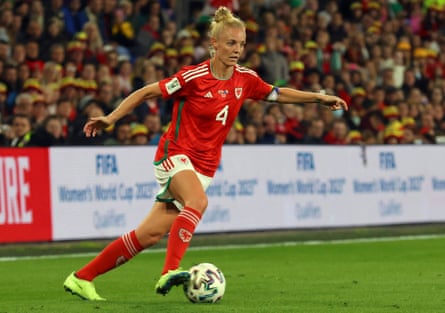So far this year Sophie Ingle has helped broker a watershed equal pay deal with the Football Association of Wales, received an OBE at Windsor Castle and played a key role in Chelsea’s treble pursuit.
With barely a blank space remaining in the Wales captain’s 2023 diary until July, it seems small wonder she is rather looking forward to watching this summer’s World Cup in Australia and New Zealand from the comfort of a sofa. As much as her country’s failure to qualify hurt, the midfield anchor will welcome the rest.
“Not making the World Cup was tough but I’ll love watching it,” says Ingle. “There’s always pros, as well as cons, to not qualifying for tournaments and it means I get time for a proper break. Hopefully we’ll make it to Switzerland for the next Euros.”
More immediately, the 31-year-old intends to reach June’s Champions League final in Eindhoven. Chelsea could take a significant step towards that showpiece by beating Barcelona at Stamford Bridge on Saturday in the first leg of a semi-final that offers Emma Hayes’s players a chance to atone for their 4-0 Champions League final defeat against the same opponents in Gothenburg two years ago.
“In the back of our minds we’ll all be thinking of that game,” acknowledges Ingle, whose adored father, Stephen, died a month before the 2021 final. “But we’ve changed a lot since then. Barcelona are a great team and have to be nullified but, if we play to our strengths, there’s no reason why we can’t win. It will be a great test.
“Gothenburg was difficult. We’d like to think it will never happen again. But it also reminded us that we’re not too good to lose. I think we’ve learnt a lot from it.”
With a place in this season’s FA Cup final secured and the Women’s Super League title challenge far from extinguished, Hayes’s squad are living on adrenaline. “We do have a lot of games at the minute,” says Ingle. “But sometimes that’s easier because you’re caught up in the momentum; training all the time can be a bit boring and tedious. The important things is to make sure you have a way to switch off. I’ve got two dogs and being outside walking them at each end of the day is mine.”
Ingle’s labradoodles, Ronnie and Winston, are Surrey natives but their ears have become accustomed to a second language during cross-border trips to visit their owner’s family and friends in the Barry area. “I don’t speak fluent Welsh, just small parts, but some of my family do,” Ingle says. “My small cousin goes to a Welsh school where they’re not allowed to speak English unless it’s an English lesson. I’d love to learn Welsh properly – it’s just finding the time.”
For the moment she is too busy striving to continue levelling up Wales’s sporting landscape. “Becoming an OBE was something I didn’t expect to happen, ever,” says Ingle, who has 105 international caps. “But if I’m seen as an inspiration to small girls and boys back home that’s great. And if it helps put Wales back on the map …”

She appreciates that hard-earned visibility is finally allowing the voices of leading female footballers to be heard. “It’s great that we now have social platforms,” says Ingle. “It’s good we can sometimes help change things.”
In January she celebrated the culmination of landmark negotiations involving the FAW offering Wales’s male and female teams equal appearance money. Given that the final agreement involved the men’s squad accepting 25% pay cuts, it did not happen overnight.
“We’d been speaking about equal pay for a while,” says Ingle. “A lot of discussions went into getting it over the line but the men wanted this change too.
after newsletter promotion
“A few years ago equal pay would never even have been a topic for conversation with the FAW but, in the end, they wanted it as much as we did. It’s about every young girl and boy in Wales having the same opportunities. If they’re representing their country, doing exactly the same job, they should be paid the same.”
Not so long ago female players would never have been asked if they were worried about wearing white shorts during menstruation. Now, though, the once-prevailing mood of “put up and shut up” is being swept away and Wales are debating whether to follow England in switching to a coloured pair.

“I know the FAW will support our decision,” says Ingle. “Opinions differ but, whatever we decide as a group, it’s great to be having these conversations. A few years ago discussing periods would never have been a thought, let alone a priority.”
Hayes ensured Chelsea were among the first leading women’s clubs to routinely manage players’ workloads by using potentially injury preventing menstrual tracking apps and Ingle cannot speak highly enough of her emotionally intelligent manager. “Emma’s unafraid of making changes and her attention to detail’s as good as anyone’s,” she says. “Her ability to notice minute tactical things straight away mid-game and implement immediate alterations make a big difference to us.
“From my first day with her here five years ago I asked Emma to be honest with me and she has been. Sometimes we have tough conversations but she’s pushed and improved me every day. I think those difficult talks have helped me grow as a person as well as a footballer.”

